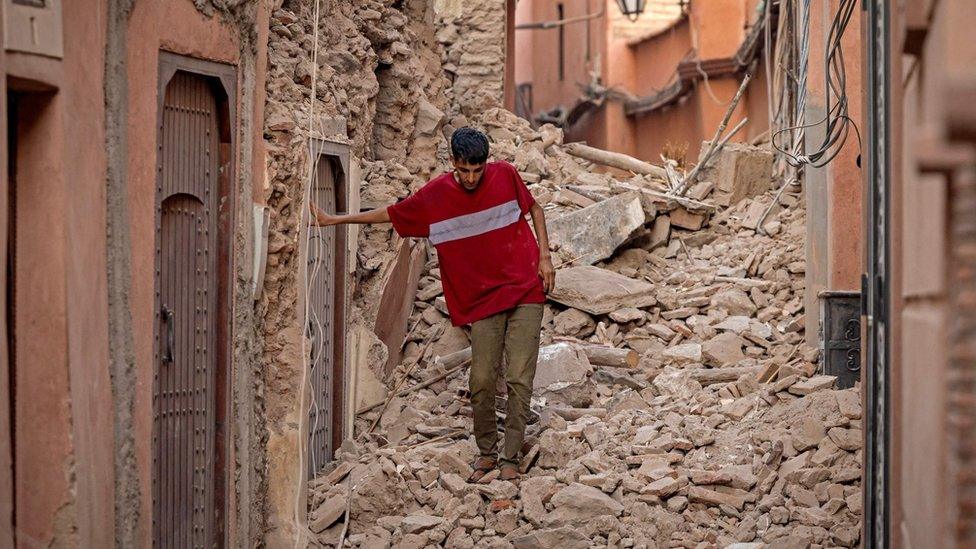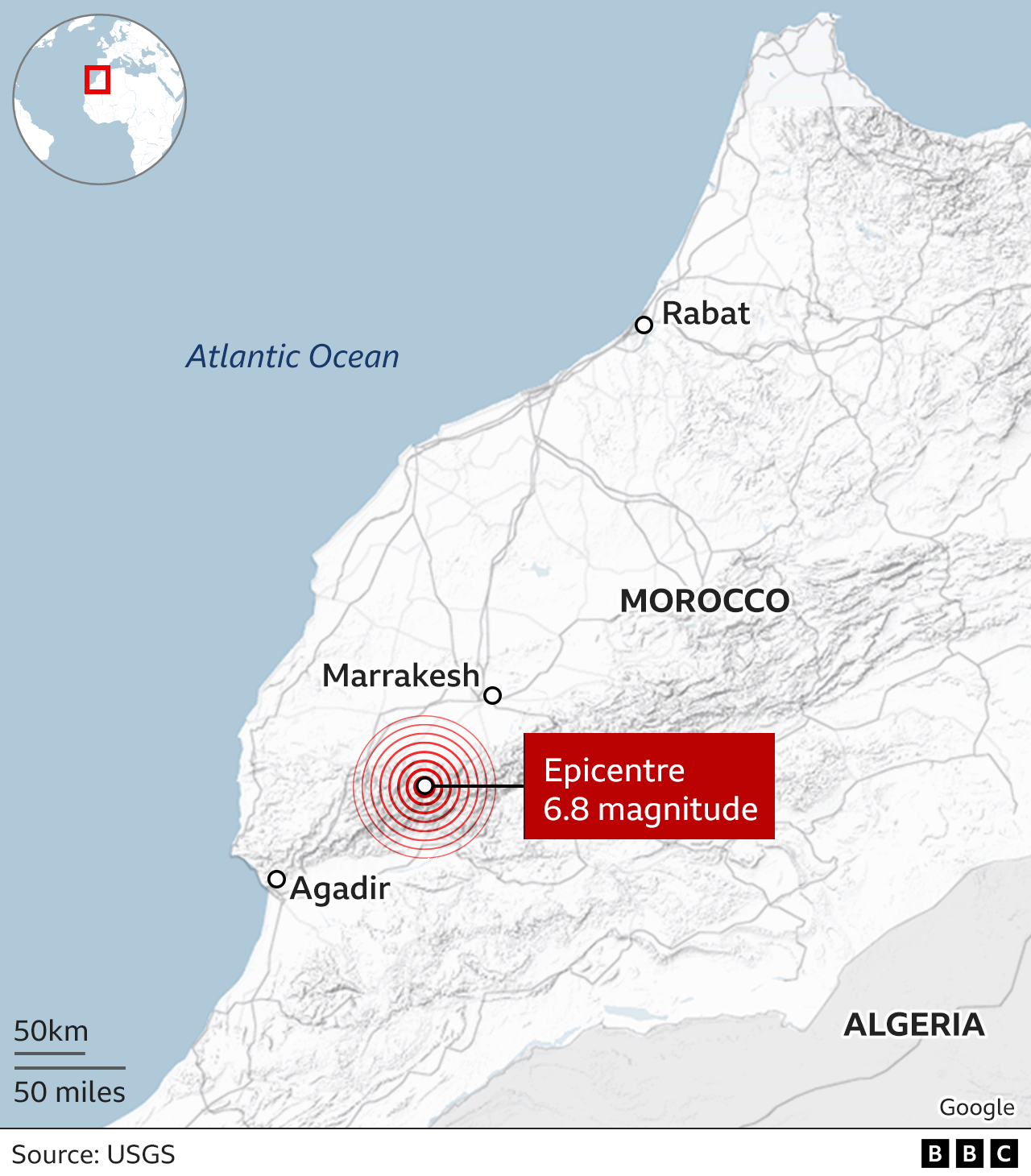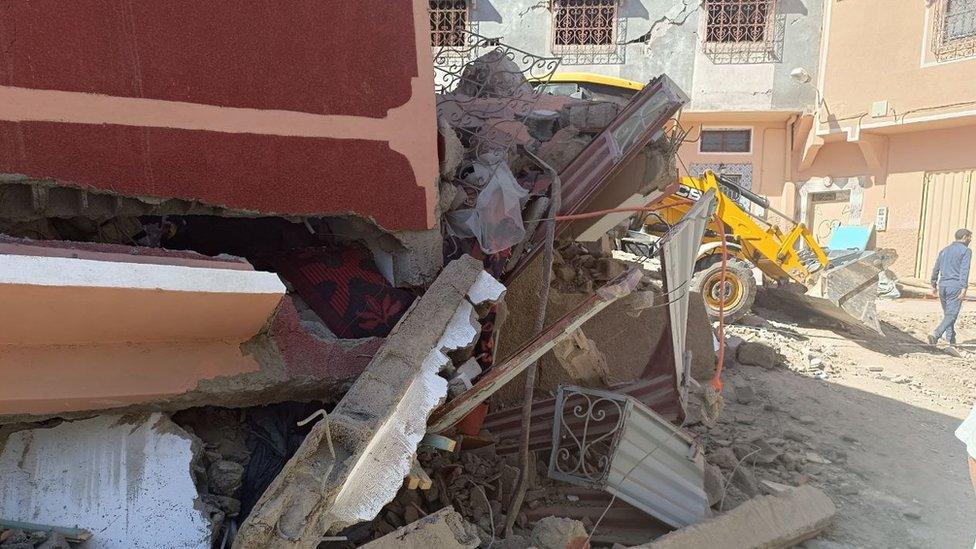Morocco earthquake: What we know
- Published

An earthquake has hit Morocco, leading to thousands of deaths and injuries. Here is a look at what we know so far.
What has happened in Morocco?
The earthquake struck central Morocco, killing thousands of people. It's feared entire villages could be flattened.
The quake, which happened at 23:11 local time (22:11 GMT), measured 6.8. An aftershock of 4.9 struck 19 minutes later.
Where did the earthquake strike?
The epicentre was in a sparsely-populated area of the High Atlas Mountains, 71km (44 miles) south-west of Marrakesh, a major tourist destination.
Many of the victims are thought to have been in remote areas, with deaths confirmed in the provinces and municipalities of Marrakesh, al-Haouz, Ouarzazate, Azilal, Chichaoua and Taroudant.
People are also feared to be trapped there, with a family said to be in the rubble of their house in the town of Al-Haouz, near the epicentre.

What damage has been done?
Many buildings in Marrakech have been destroyed or damaged. The damage is particularly severe in parts of the Medina, a Unesco World Heritage site.
Dust could also be seen surrounding the minaret of the historic Kutubiyya mosque, a major tourist attraction near the old city's main square.
But several other towns near Marrakech - such as Amizmiz - have also been hit.
The extent of the damage in mountain villages is unknown, but it is believed to be widespread.
What did survivors say?
Michael Bizet, who was in Marrakesh's old town, said he thought his bed was going to "fly away". "It was total chaos, a real catastrophe, madness," he told AFP news agency.
Fayssal Badour, who lives in the city, was driving when the quake hit. "I stopped and realised what a disaster it was," he told the news agency. "The screaming and crying was unbearable."
Mina Metioui told the BBC the noise sounded like "a fighter jet", getting louder and louder.
"It took a second that felt like minutes," she told BBC News. "Then I heard people screaming, getting out the property... It was really a horrible experience."
Has Morocco had many earthquakes before?
The last major earthquake in the country struck the north-eastern city of Al Hoceima, external in 2004, killing at least 628 people.
And the deadliest was in Agadir on the southern Atlantic coast, in 1960. The magnitude 6.7 quake killed about 12,000.

What happens now?
Efforts continue to try to find people. It could take some time to determine casualties in remote mountain villages near the epicentre.
It is likely the death toll will rise as rescue efforts continue.
Authorities have called on residents to donate blood to assist the injured.
What has the international reaction been?
US President Joe Biden says he is "deeply saddened by the loss of life and devastation".
UK Foreign Secretary James Cleverly said: "We stand ready to help our Moroccan friends in whatever way we can." He said the UK was supporting British nationals in the region.
French President Emmanuel Macron said he was "devastated" and his country stands "ready to help with first aid".
Spanish Prime Minister Pedro Sánchez said: "All my solidarity and support to the people of Morocco in the wake of this terrible earthquake."
India's Narendra Modi, speaking at the G20 summit in Delhi, said the international community would come to Morocco's aid.
Vladimir Putin said Russia shared "the pain and the mourning of the friendly Moroccan people".
Ukraine's Volodymyr Zelensky expressed his solidarity and sent his "deepest condolences" to Morocco.